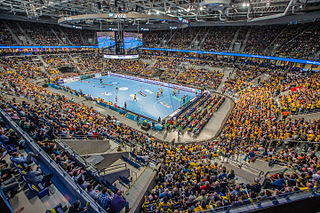
Handball is a team sport in which two teams of seven players each pass a ball using their hands with the aim of throwing it into the goal of the opposing team. A standard match consists of two periods of 30 minutes, and the team that scores more goals wins.
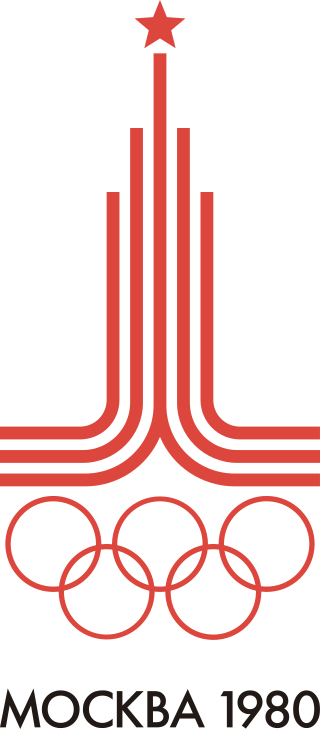
The 1980 Summer Olympics, officially known as the Games of the XXII Olympiad and officially branded as Moscow 1980, were an international multi-sport event held from 19 July to 3 August 1980 in Moscow, Soviet Union, in present-day Russia. The games were the first to be staged in an Eastern Bloc country, as well as the first Olympic Games and only Summer Olympics to be held in a Slavic language-speaking country. They were also the only Summer Olympic Games to be held in a self-proclaimed communist country until the 2008 Summer Olympics held in China. These were the final Olympic Games under the IOC Presidency of Michael Morris, 3rd Baron Killanin before he was succeeded by Juan Antonio Samaranch, a Spaniard, shortly afterwards.

A heptathlon is a track and field combined events contest made up of seven events. The name derives from the Greek επτά and ἄθλος. A competitor in a heptathlon is referred to as a heptathlete.
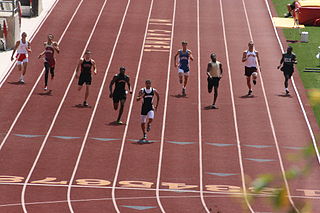
The 400 metres, or 400-meter dash, is a sprint event in track and field competitions. It has been featured in the athletics programme at the Summer Olympics since 1896 for men and since 1964 for women. On a standard outdoor running track, it is one lap around the track. Runners start in staggered positions and race in separate lanes for the entire course. In many countries, athletes previously competed in the 440-yard dash (402.336 m)—which is a quarter of a mile and was referred to as the "quarter-mile"—instead of the 400 m (437.445 yards), though this distance is now obsolete.

Swimming has been a sport at every modern Summer Olympics. It has been open to women since 1912. At the Olympics, swimming has the second-highest number of medal-contested events.

Australia was represented at the 2002 Commonwealth Games by a team selected by the Australian Commonwealth Games Association (ACGA) and abbreviated AUS.

The 200 metres, or 200-meter dash, is a sprint running event. On an outdoor 400 metre racetrack, the race begins on the curve and ends on the home straight, so a combination of techniques is needed to successfully run the race. A slightly shorter race, called the stadion and run on a straight track, was the first recorded event at the ancient Olympic Games. The 200 m places more emphasis on speed endurance than shorter sprint distances as athletes predominantly rely on anaerobic energy system during the 200 m sprint. Similarly to other sprint distances, the 200 m begins from the starting blocks. When the sprinters adopt the 'set' position in the blocks they are able to adopt a more efficient starting posture and isometrically preload their muscles. This enables them to stride forwards more powerfully when the race begins and start faster.

The 1500 metres or 1,500-metre run is the foremost middle distance track event in athletics. The distance has been contested at the Summer Olympics since 1896 and the World Championships in Athletics since 1983. It is equivalent to 1.5 kilometers or approximately 15⁄16 miles. The event is closely associated with its slightly longer cousin, the mile race, from which it derives its nickname "the metric mile".
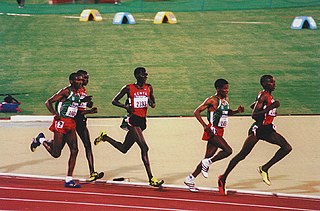
The 10,000 metres or the 10,000-metre run is a common long-distance track running event. The event is part of the athletics programme at the Olympic Games and the World Athletics Championships, and is common at championship-level events. The race consists of 25 laps around an Olympic-sized track. It is less commonly held at track and field meetings due to its duration. The 10,000-metre track race is usually distinguished from its road running counterpart, the 10K run, by referring to the distance in metres rather than kilometres.

The 100 metres hurdles, or 100-meter hurdles, is a track and field event run mainly by women. For the race, ten hurdles of a height of 33 inches (83.8 cm) are placed along a straight course of 100 metres (109.36 yd). The first hurdle is placed after a run-up of 13 metres from the starting line. The next 9 hurdles are set at a distance of 8.5 metres from each other, and the home stretch from the last hurdle to the finish line is 10.5 metres long. The hurdles are set up so that they will fall over if bumped into by the runner, but weighted so this is disadvantageous. Fallen hurdles do not count against runners provided that they do not run into them on purpose. Like the 100 metres sprint, the 100 m hurdles begins with athletes in starting blocks.

The steeplechase is an obstacle race in athletics which derives its name from the steeplechase in horse racing. The foremost version of the event is the 3000 metres steeplechase. The 2000 metres steeplechase is the next most common distance. In youth athletics, a distance of 1000 metres is occasionally used for steeplechase races.

Saint Kitts and Nevis first participated at the Olympic Games in 1996, and have competed in every Summer Olympic Games since then. The country has never won an Olympic medal and has not competed at the Winter Olympic Games.
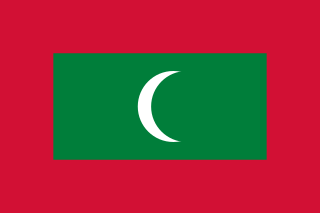
The Maldives first participated at the Olympic Games in 1988. It has sent athletes to compete in every Summer Olympic Games since, but has not participated in the Winter Olympic Games.

Cate Natalie Campbell, is an Australian former competitive swimmer. She is the current world record holder in the short course 100 m freestyle. She is also a former world record holder in the long course 100 m freestyle, breaking Britta Steffen's supersuit WR by 0.01.

The 100 metres at the Summer Olympics has been contested since the first edition of the multi-sport event. The men's 100 metres has been present on the Olympic athletics programme since 1896. The 100 metres is considered one of the blue ribbon events of the Olympics and is among the highest profile competitions at the games. It is the most prestigious 100 metres race at an elite level and is the shortest sprinting competition at the Olympics – a position it has held at every edition except for a brief period between 1900 and 1904, when a men's 60 metres was contested.

Emma Jennifer McKeon, is an Australian competitive swimmer. She is an eight-time world record holder, three current and five former, in relays. Her total career haul of 11 Olympic medals following the 2020 Olympic Games made her Australia's most decorated Olympian and included one gold medal from the 2016 Summer Olympics in Rio de Janeiro and four gold medals from the 2020 Summer Olympics in Tokyo. With four gold and three bronze medals she was the most decorated athlete across all sports at the 2020 Summer Olympics, and tied for the most medals won by a woman in a single Olympic Games. She has also won 20 medals, including five gold medals, at the World Aquatics Championships; and a record 20 medals, including 14 gold, at the Commonwealth Games.

Shooting competitions at the 2018 Commonwealth Games in Gold Coast, Australia were held from 8 to 14 April at the Belmont Shooting Centre, Brisbane.
Swimming at the 2019 World Aquatics Championships was held from 21 to 28 July 2019.

















